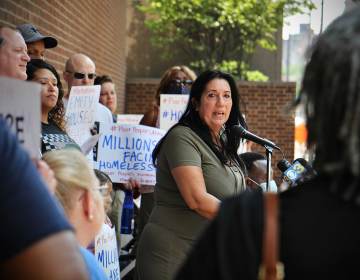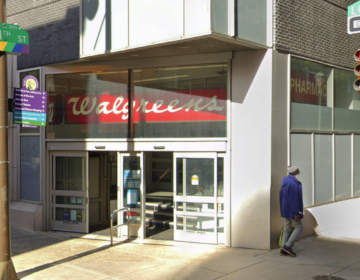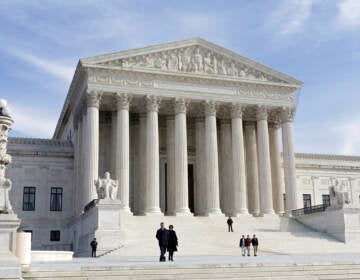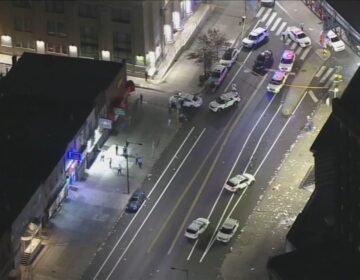Housing activists drop lawsuit against Kenney administration over encampment sweeps
Housing activists withdrew a lawsuit against Mayor Jim Kenney’s administration over a plan to allegedly displace people living in a Kensington encampment.
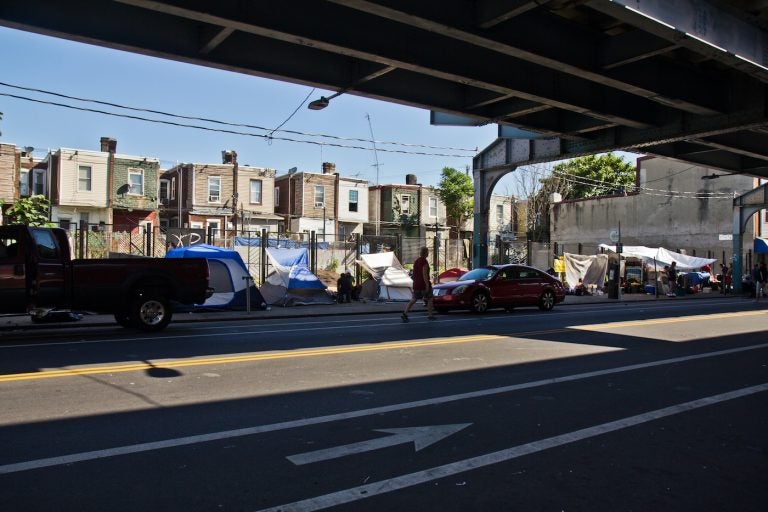
Tents set up by people experiencing homelessness along Kensington Avenue. (Kimberly Paynter/WHYY)
Housing activists withdrew a lawsuit against Mayor Jim Kenney’s administration over a plan to allegedly displace people living in a Kensington encampment because only one of their 11 unhoused plaintiffs ended up showing up to court.
The agreement brokered Wednesday dismisses the lawsuit without prejudice. Under the deal, the activists behind the case, Stephanie Sena, an anti-poverty fellow and professor at Villanova’s Charles Winter School of Law, and Villanova law student Delaney Keefe, can refile while the administration will not plan any evictions of the encampments until Aug. 1 at the earliest. The city maintains the authority to do daily maintenance and cleaning around the encampment.
“It has been established that the City has consistently followed all constitutionally necessary procedures while engaging in the difficult task of encouraging individuals to come in off the street,” a spokesperson for the Kenney administration said. “These cleanings are for the safety and benefit of everyone in Kensington and were needlessly put at risk as a result of certain misguided individuals who inappropriately mischaracterized the City’s sanitation efforts in that neighborhood.”
Sena and Keefe said they plan to refile the suit.
Keefe said two of their plaintiffs were injured and others they either couldn’t find when it was time to pick them up from the encampment this morning or were in treatment for substance abuse.
“We will not stop fighting until our neighbors on the streets have safe and affordable housing,” Sena said. “We don’t have to live like this, homelessness is not inevitable. It is not something we need to accept as just part of our landscape.”
Sena, Keefe, and attorney Michael Huff filed the now-dismissed lawsuit last month over plans to send social workers and others to clear unhoused people off the streets of Kensington. The suit alleged that the city is violating unhoused people’s Fourth Amendment right to live without unreasonable searches and seizures. The lawsuit’s argument hinged on its allegation that the city doesn’t have enough beds for the unhoused and therefore, people who are displaced from the encampments have nowhere to go.
Cynthia Kerbaugh, 37, one of the plaintiffs who appeared at the courthouse Wednesday, has lived on the streets of Kensington for three years after she and her husband, Tommy, lost their house in a fire. Kerbaugh said police dispose of her belongings when the city does the sweeps the lawsuit sought to stop.
“On numerous occasions, they’ve come and thrown our stuff away and harassed us,” she said through tears. “It’s an eviction every day. They just treat us completely unfairly.”
Kerbaugh said she’s willing to be a plaintiff again when the case is refiled and hopefully, others will be able to join her.
Housing activists hope the lawsuit pushes the city to create more permanent housing for people and affects change as part of a movement of lawsuits filed in courts across the country over the criminalization of encampments.
‘We’re fighting for our children to…walk to the El’
But while many Kensington residents support the activists’ call for more permanent, subsidized housing, their immediate demand is to see unhoused people off their neighborhood streets. These neighbors support the city’s sweeps.
“We never didn’t support housing for people,” said Sonja Bingham, a 15-year Kensington resident who lives a block away from one encampment. “We just want people off our street.”
Bingham said she doesn’t appreciate activists coming in who don’t live there arguing about how they should address the neighborhood’s homelessness issue.
“We’re fighting for our children to be able to simply walk two blocks to the El and you’re saying, ‘no, we want to leave conditions as they are and the status quo in your community,’’ Bingham said. “That’s a really big oversight. You can never go into someone else’s home and start rearranging furniture without asking them.”
This isn’t the first time the city has tried to remove encampments in Kensington. In the summer of 2018, the city tried to do a pilot to remove encampments in Kensington. The following year, a city report came out talking about the success. That summer after the closures, the number of unsheltered people ballooned to 700. The report said the increase was unrelated to closures but the efforts to shirk the gains were unsuccessful as police struggled to prevent new encampments and more people slept in makeshift outdoor locations near former encampments.
The report said, “the modest initiative to close two encampments underscores the massive scale of the affordable housing and opioid addiction problems in Philadelphia and nationally.” The report also shows that of the 189 unhoused people on the unhoused list, only 19% ended up in some form of long-term housing and only 8.5% landed permanent housing.

Subscribe to PlanPhilly
WHYY is your source for fact-based, in-depth journalism and information. As a nonprofit organization, we rely on financial support from readers like you. Please give today.



